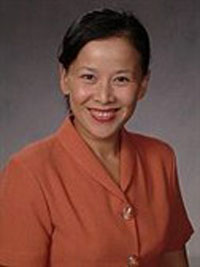| Jan 19, 2013 | |
Observing the dynamic work hardening event in nanocrystalline nickel during multiple loading-unloading cycles |
|
| (Nanowerk News) According to Dr. Haiyan Wang, an associate professor in the Department of Electrical and Computer Engineering at Texas A&M University, strain hardening capability is critical for metallic materials to achieve high ductility during plastic deformation. A majority of nanocrystalline metals, however, have inherently low work hardening capability with few exceptions and interpretations on work hardening mechanisms in nanocrystalline metals are still controversial due to the lack of in situ experimental evidence. | |
 Dr. Haiyan Wang Wang and her team use an in situ transmission electron microscope nanoindentation tool to directly observe the dynamic work hardening event in nanocrystalline nickel during multiple loading-unloading cycles. These quantitative nanoindentation experiments showed an increase of yield strength from 1.64 to 2.29 GPa during the multiple loading-unloading cycles. Their study ("Direct observation of Lomer-Cottrell Locks during strain hardening in nanocrystalline nickel by in situ TEM") provides both the evidence to explain the roots of work hardening at small length scales and the insight for future design of ductile nanocrystalline metals. Wang joined the electrical and computer engineering department in January 2006. Before coming to Texas A&M, she was on the staff of the Los Alamos National Laboratory as a director-funded post-doctoral fellow and a permanent staff member. She holds a Bachelor of Science degree from Nanchang University (China) and a master’s degree from the Institute of Metal Research (China). She received the Ph.D. degree from North Carolina State University in December 2002. |
|
| Other honors include the ASM Silver Medal Award in 2011, the National Science Foundation’s CAREER Award in 2009, the Presidential Early Career Award for Scientists and Engineers (PECASE) in 2008, the Office of Naval Research Young Investigator Award in 2008 and the Air Force Research Office’s Young Investigator Research Program (YIP) in 2007. | |
| Her research interests lie in the area of functional oxide and nitride thin films for microelectronics, optoelectronics, high-temperature superconductors, solid oxide fuel cells, solar cells and advanced nuclear reactors. Her expertise is thin-film growth and characterizations. |
| Source: Texas A&M University |
